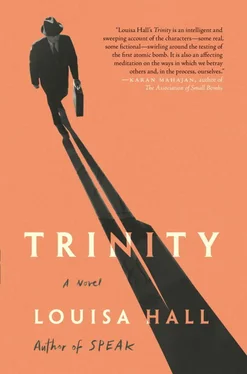Nancy gazed at it for a moment. Then she sighed and averted her eyes. Toward the end of July, she said, she’d had enough. The Oppenheimers had run the house for too long. Sometime after midnight, Kitty was at it again, rattling around, and Nancy got out of bed and marched out to the kitchen, where she found Kitty herself: pale as a ghost, dressed in nothing but a black negligee. Tail up, head down, her face shoved in the freezer like a skunk with its snout caught in a tin can.
She was using a flashlight, Nancy said, and fishing for ice at the back of the drawer. Then Nancy marched over and pulled her out of the freezer. Kitty, she said, no one who drinks all night needs ice in their whiskey.
When Nancy delivered this line, Bob laughed mechanically. He’d heard it before.
For a moment, Nancy examined him again. She was still beautiful, with that thick head of burnished gold hair. But Bob’s hair had started receding, and the emerging dome of his forehead was sunburned. Nancy noted it, then went on with her story.
Apparently, interrupted in her foraging, Kitty drew herself out of the freezer. Then she took one look at Nancy, and swung the flashlight straight at her face.
Nancy had a bruise for two weeks. When she got back to bed, she told Bob she was going to visit her mother in Boston, at least until those lunatics had abandoned the guest room.
HAVING FINISHED HER STORY, NANCY TOOK A TRIUMPHANT SIP OFchampagne.
Alice pointed out toward the horizon. “What are those lights?” she said.
Far off in the distance, there was a swarm of tiny globes of white light, bobbing up some invisible hillside.
Nancy glanced over her shoulder. She shrugged. No idea, she said.
Some ceremony or other, Bob guessed.
The dots of light kept swimming up. It looked as if a mob of angry villagers were storming the sky holding torches.
Of course Kitty’s insane, Nancy went on, but given a choice, I’d take her over Robert.
I don’t agree, Bob said, but Nancy ignored him.
It’s him who’s the real devil, Nancy said, leaning forward. He’s what’s driven her crazy. Once, you know, we asked him about Hiroshima. We assumed he’d be nearly mad with remorse. But he said he didn’t regret what he’d done. He said he never had. And I said, but what about the radiation sickness? What about all the children dying of leukemia? What about the birth defects? What about the people who haven’t been affected yet but still have to wait around, afraid of the day when they will be?
Then Nancy paused and took another sip of her champagne. Out in the darkness, those little globes of light were still climbing.
Anyway, Nancy said, he heard what I had to say. To his credit, he stayed there and listened. But even then he didn’t say he was sorry. He just listened, and didn’t respond, until finally he said something about how a scientist’s job is to know, and how that’s what he’d done. He’d set out to know the mystery of the atom. And I wanted to say, then how about you figure out the mystery of leukemia? Or how about, if you’re so smart, you figure out the mystery of why people wage war? But I knew it wouldn’t make any difference. You could tell how smug he was about the whole thing. He’d accomplished what he set out to accomplish.
Then Nancy finished. She took a bite of grilled shrimp. Alice was still gazing off at the far hillside. Those bobbing globes were reflected in her dark eyes, so that it seemed as if her pupils were giving off sparks.
Then the check came, and Bob disappeared under the table. Nancy watched him carefully. I took the check, and he surfaced again.
Your chin, Bob, Nancy said, at least ten or twenty minutes after she should have.
LATER, BACK IN OUR ROOM, ALICE LET DOWN HER HAIR AND SAT ONthe edge of our bed. “I can’t stand them,” she said.
I started laughing. “We’ll never see them again,” I said.
She’d opened the shutters, and the moonlight shone on her hair. When she bent to rub lotion into her calves, she moved her hands in long, deliberate strokes, like someone washing clothes in a river.
AFTER THAT, IT WAS JUST US AGAIN IN THE HOTEL. ALICE DID HERbest to make me think she was happy, but I know it wasn’t easy for her.
It wasn’t easy for me, either. What happened in New York was still so close behind us. I felt it breathing down the back of my neck.
To escape it, I hovered around her too much. She tried to pretend my hovering didn’t bother her, but some days she’d startle when I walked into a room. Then I’d catch her absently fiddling with the ring I gave her in Washington, as though it irritated her finger. At night, she’d sleep on the far edge of the bed, and sometimes, when she came home from a walk, she’d knock around in the room for a while, stubbornly maintaining her distance, before finally giving in and coming over to kiss me.
Such little gestures. On their own, none of them meant much. But taken together, after what we’d left behind us, it was difficult for me not to transform them into signs of an impending departure.
I tried to keep myself busy, to avoid thinking such thoughts. I went out for long walks in the hills, keeping my back turned to the water. I moved uphill. That was a dry summer, and though the valleys were still dense and matted with green, as you climbed up the mountains, the hills that rose beyond you began to look like loaves of brown bread, studded with blue clumps of agave like spots of mold on the bread crust.
I walked until I was too tired to think. On bad days, that was my only relief. I’d walk until my thoughts had flattened out to nothing more than the sounds of my own footsteps crunching the stones. And I’d only start thinking again if I stopped, and sat down for a while on one of those rocks covered in suspended sea-green explosions of lichen.
Once I’d started thinking, I couldn’t stop. Then, sometimes, I hated Alice. Sometimes I hated myself. I should have taken her away from Washington, I’d think to myself. I should have swept her off somewhere else.
Why didn’t I see, earlier on, that we had to leave that despicable city?
I should have forced her to give up that job. We didn’t need the money she made. She’d only taken it to prove I didn’t have to support her. But trying to hang on to that job, when so many people were getting laid off: it made her start to go crazy. She became maniacal about keeping things between us a secret. She stopped wearing her ring. We stopped going out with our friends. If we went to a restaurant and ran into someone she knew, she’d introduce me as an old friend from college.
Then all through dinner she wouldn’t touch me. She didn’t hold my hand on the table. And if I reached underneath it to put my hand on her knee, she’d swat it away and her face would go stony.
After a while, we stopped going out to dinner together. It was easier just to see each other at home.
I wasn’t working, so I wasted my days taking walks, or reading magazines in the park, but every second article was about some Hollywood star who’d been “exposed as a queer,” or some politician who was “found out for a pervert.”
At home, every time I turned on the TV a senator was getting interviewed about the secret menace of Communism in this country, about how you just couldn’t tell: your neighbor might be a Red, your secretary might be a Red, your own mother might be a Commie.
Then the conversation would take a new turn, and the same senator, looking dignified in his dark suit, would say you couldn’t separate homosexuals from subversives, because anyone who was keeping a secret was suspect.
So these senators said, as though they weren’t the reason people were forced to keep secrets.
Читать дальше












